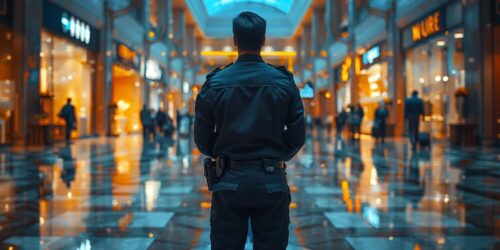
11.20.24 – Yaniv Amir
Security integrators must recommend retail clients use integrated security systems with real-time interventions and proactive deterrence.
In the first half of 2024, retail theft rates rose by 24%, causing stores and businesses across America to lose billions of dollars’ worth of goods.
High-value items such as electronics, jewelry, tobacco, pharmaceutical drugs, and firearms, are the most likely to be stolen given their resale potential, making them particularly attractive to thieves. Jewelry theft alone hit a 13-year high in 2022, and a 2023 survey found that nine out 10 jewelers have been the victim of a crime.
Newsworthy “smash-and-grab” incidents at luxury stores drove retail crime to become a $100 billion “industry.”
Retailers have historically relied on standard security systems, which provide alerts and surveillance of a crime but can do little to prevent it or intervene.
To effectively safeguard high-risk assets, security integrators must recommend to their retail clients advanced, integrated security systems that are capable of real-time interventions and proactive deterrence.
Traditional Retail Security Gaps
Traditional security measures are vital for safeguarding retail locations and properties, offering essential detection capabilities that help protect against threats. However, while these systems provide a strong foundation, they primarily serve as passive tools, reporting and recording crimes but unable to actively prevent them. For truly enhanced security systems, retailers require an additional protective layer that can prevent incidents before they occur, effectively closing the gap left by traditional solutions.
Conventional cameras and alarm systems rely heavily on electricity and Wi-Fi, which can easily be disrupted, and seasoned criminals are unlikely to be deterred by a camera in the corner of the store. Criminals often know how to exploit these vulnerabilities, leaving retail clients at the whims of power outages or network failures, whether induced or accidental.
Rising crime rates, trimmed budgets, and false alarms have led to prolonged police response times across the country. In New Orleans, for example, average response times nearly tripled, from 51 minutes in 2019 to 146 minutes last year.]
In New York, the increase was smaller but still significant, rising from 18 minutes to 33. These figures are just a sampling of what’s going on nationally, and with passive detection systems, thieves have ample time to escape with stolen goods before law enforcement arrives. Without systems that can intervene, retailers are left watching and recording thieves take off with valuable goods.
To help retail clients proactively prevent crime, security integrators should instead distribute integrated security systems that not only detect and report on a crime in progress but also have the capability to stop them in real-time. Such systems must be robust, adaptable, and smart enough to anticipate and counteract various threats.
Integrated Solutions for Retail Crime Prevention
Fortunately, there are a growing number of tailored solutions that address these shortcomings. Equipped with advanced security tools, AI-driven solutions, and real-time intervention technologies, security integrators are increasingly able to offer retailers the lifeline they need.
One simple preventative approach is to ensure that security systems have the ability to blare a siren, warning or other loud noise when a crime is detected to try to scare off burglars.
Physically securing high-risk assets — bars and gates on windows, reinforced walls and doors — is another simple way to prevent theft. Security integrators can recommend and install barriers like reinforced doors and smart locks to prevent access to high-risk assets. Such barriers are particularly important for retailers that handle high-value products or regulated goods like firearms, where the consequences of theft can be far-reaching.
One of the more innovative and effective physical deterrents widely deployed outside of the US is to employ fog-generating systems which fill a room with a disorienting haze when a threat is detected.
These systems offer a unique means of preventing theft in progress as they remove visibility and coerce thieves to flee empty-handed. These systems can be integrated into existing security setups or deployed as standalone solutions.
Fog security systems are also adaptable as they can be installed in a variety of retail environments, from warehouses to smaller luxury boutiques, making them effective across a range of retail sectors.
These approaches give retail clients a better chance at stopping a crime without having to rely on a quick first responder arrival.
Secure Your Assets
Traditional security measures in retail establishments are good at detecting a crime in progress but, due to various factors, are no longer enough. Rather than simply reacting to crimes after they occur, security integrators must offer solutions that proactively prevent crime — advanced, integrated solutions such as AI-driven monitoring or physical deterrents like fog generating systems and smart locks.
Running a retail business can be challenging enough even without the threat of theft. By offering tailored solutions based on the specific threats their clients face, security integrators can help mitigate this threat, offering retailers the peace of mind to do what they do best — sell.
Yaniv Amir is president of Essence Group USA.
